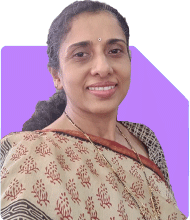Ramalingam Kalirajan |4207 Answers |Ask -Follow
Mutual Funds, Financial Planning Expert - Answered on Jul 01, 2024
He has an MBA in finance from the University of Madras and is a certified financial planner.
He is the director and chief financial planner at Holistic Investment, a Chennai-based firm that offers financial planning and wealth management advice.... more

Hi sir , iam 26 years unmarried having salary of around 1 lacs with expenses monthly with all emi,bills, groceries,parents health insurance and self ,term plan ,ppf,nps goes around 40k per month. So i have got to understand it's better to have an emergency fund like 6 times the expenses that goes like 2.4L so should I maintain this every year or should I keep it for a fixed period like RD investment. Please guide me sir
Determining the Size of Your Emergency Fund
You’ve correctly identified the need for an emergency fund covering six months of expenses. With your monthly expenses at Rs. 40,000, your target emergency fund is Rs. 2.4 lakhs. Here’s why this is a good benchmark:
Peace of Mind: Knowing you have funds set aside for emergencies reduces stress and anxiety about financial uncertainties.
Financial Stability: An emergency fund ensures you can handle unexpected costs without impacting your other financial goals.
Avoiding Debt: Having a fund prevents you from resorting to high-interest loans or credit cards in emergencies.
Maintaining the Emergency Fund
Lump Sum vs. Recurring Contributions
You can build your emergency fund through a lump sum or recurring contributions. Let’s explore both options:
Lump Sum: This involves saving a large amount at once until you reach your target. It provides immediate financial security but requires discipline to avoid using the fund for non-emergencies.
Pros: Quick way to reach your target, immediate availability of funds.
Cons: Requires significant savings initially, may tempt you to use it for other purposes.
Recurring Contributions: This method involves setting aside a portion of your monthly income until you reach the target. It’s easier to manage within your budget and builds the fund gradually.
Pros: Easier to budget, less financial strain, builds saving habit.
Cons: Takes longer to build the fund, requires consistent contributions.
Investment Options for Your Emergency Fund
Choosing the right place to keep your emergency fund is crucial. It should be easily accessible and low-risk. Here are some options:
Savings Account
A savings account is the most straightforward option for an emergency fund. It offers quick access to your money whenever you need it.
Pros: Highly liquid, low risk, no lock-in period.
Cons: Low-interest rates, minimal growth.
Fixed Deposits (FDs)
FDs offer higher interest rates than savings accounts. You can use a laddering strategy, which involves investing in multiple FDs with different maturity dates. This ensures liquidity while earning better returns.
Pros: Higher interest rates, predictable returns.
Cons: Lock-in period, penalties for early withdrawal.
Liquid Mutual Funds
Liquid mutual funds invest in short-term instruments, providing better returns than savings accounts with quick access to funds, typically within 24 hours.
Pros: Better returns, easy access to funds.
Cons: Some market risk, slight delay in accessing funds.
Fixed Period vs. Ongoing Maintenance
Fixed Period
Maintaining your emergency fund for a fixed period means setting aside Rs. 2.4 lakhs and reviewing it periodically. This method ensures you have a sufficient fund without actively contributing each month.
Pros: One-time effort, ensures immediate availability of funds.
Cons: May not grow with inflation, requires periodic review.
Ongoing Maintenance
Ongoing maintenance involves regular contributions to your emergency fund, adjusting for inflation and increased expenses. This approach keeps your fund up-to-date with your financial needs.
Pros: Grows with your needs, adjusts for inflation.
Cons: Requires continuous effort, may overlap with other savings goals.
Balancing Emergency Fund and Other Investments
Once your emergency fund is established, focus on other financial goals. Here’s how to balance your priorities:
Prioritizing Investments
Before investing in other goals, ensure your emergency fund is fully funded. It provides the foundation for your financial security. Only after that should you allocate resources to other investments.
Step 1: Fully fund the emergency fund.
Step 2: Allocate savings to long-term goals like retirement and education.
Diversifying Investments
Your emergency fund should be easily accessible. For other savings, diversify into mutual funds, PPF, NPS, and term plans. This diversification caters to different financial goals and risk levels.
Emergency Fund: Savings account, FDs, or liquid mutual funds.
Long-term Goals: Equity mutual funds, PPF, NPS.
Regular Review and Adjustment
Annual Review
Review your emergency fund annually. Assess changes in your expenses, inflation, and financial goals. Adjust the fund size to ensure it remains sufficient.
Expenses: Have your monthly expenses increased?
Inflation: Has the cost of living gone up?
Goals: Have your financial priorities changed?
Life Changes
Major life events like marriage, job change, or having children can impact your financial needs. Adjust your emergency fund accordingly to cover these new expenses.
Marriage: Plan for additional household expenses.
Job Change: Ensure you have enough buffer during transition periods.
Children: Increase the fund to cover potential child-related emergencies.
Role of a Certified Financial Planner (CFP)
Personalized Guidance
A CFP offers tailored advice based on your unique financial situation and goals. They help in creating a comprehensive plan that includes emergency fund management and long-term investments.
Personalized Plans: Develop a plan that suits your lifestyle and financial goals.
Comprehensive Advice: Get guidance on all aspects of financial planning.
Investment Strategy
CFPs recommend diversified investment strategies that align with your risk tolerance and financial objectives, ensuring optimal growth and security.
Risk Assessment: Understand your risk tolerance and invest accordingly.
Strategy: Create a balanced portfolio for growth and security.
Tax Efficiency
A CFP helps you maximize tax benefits through strategic investments, ensuring you retain more of your earnings for future needs.
Tax Planning: Invest in tax-efficient instruments.
Maximize Returns: Ensure you retain more of your income.
Building a Robust Financial Plan
Short-term Goals
Ensure liquidity for immediate needs through savings accounts and liquid funds. This covers unforeseen expenses without impacting long-term investments.
Emergency Fund: Prioritize liquidity for immediate access.
Short-term Savings: Use low-risk, accessible instruments.
Medium-term Goals
For goals like buying a car or planning a wedding, use balanced funds and recurring deposits. These offer moderate returns with manageable risks.
Balanced Funds: Mix of equity and debt for moderate returns.
Recurring Deposits: Consistent savings for medium-term goals.
Long-term Goals
Invest in equity mutual funds, PPF, and NPS for long-term growth. These instruments help build a substantial corpus for retirement and other significant expenses.
Equity Mutual Funds: Higher returns for long-term growth.
PPF and NPS: Secure investments with tax benefits.
Health Insurance and Term Plans
Adequate Coverage
Ensure comprehensive health insurance for yourself and your parents. This covers medical emergencies without depleting your savings.
Personal Health Insurance: Adequate coverage for your needs.
Parents’ Health Insurance: Ensure they are covered for medical emergencies.
Term Insurance
A term plan provides financial security for your dependents. Ensure the coverage is sufficient to cover liabilities and provide for your family in your absence.
Term Plan: Adequate coverage to protect your dependents.
Liability Coverage: Ensure it covers your debts and obligations.
Managing Debt
EMI and Loans
Ensure your EMIs and loan repayments are within manageable limits. Avoid taking on additional debt that could strain your finances.
Debt Management: Keep EMIs within a comfortable range.
Avoid Over-borrowing: Prevent financial strain from excessive debt.
Debt Reduction
Focus on paying off high-interest debt first. This reduces financial burden and frees up funds for savings and investments.
Priority Repayment: Clear high-interest debt quickly.
Free Up Funds: Use savings for investments.
Final Insights
Your proactive approach to financial planning at 26 is commendable. Here’s a summary of the key steps to guide you:
Establish Emergency Fund: Build a Rs. 2.4 lakh emergency fund through either lump sum or recurring contributions. Ensure it's liquid and easily accessible through savings accounts, FDs, or liquid mutual funds.
Maintain and Adjust: Regularly review and adjust your emergency fund to keep pace with inflation and changes in your expenses. An annual review is essential to ensure your fund remains adequate.
Diversify Investments: After establishing your emergency fund, focus on long-term investments. Diversify your savings into mutual funds, PPF, NPS, and term plans to achieve balanced growth.
Health and Term Insurance: Ensure comprehensive health insurance for yourself and your parents, and maintain adequate term insurance coverage. This protects against medical emergencies and provides financial security for your dependents.
Debt Management: Keep EMIs within manageable limits and prioritize debt reduction. Avoid taking on new high-interest debt to maintain financial stability.
Seek Professional Advice: Consult a Certified Financial Planner for personalized guidance and a comprehensive plan that aligns with your financial goals. They can help optimize your investment strategy and maximize tax benefits.
By following these strategies, you can achieve financial stability, maintain a robust emergency fund, and build a secure future.
Best Regards,
K. Ramalingam, MBA, CFP,
Chief Financial Planner,
www.holisticinvestment.in
You may like to see similar questions and answers below
Ramalingam Kalirajan |4207 Answers |Ask -Follow
Mutual Funds, Financial Planning Expert - Answered on Apr 23, 2024
Ramalingam Kalirajan |4207 Answers |Ask -Follow
Mutual Funds, Financial Planning Expert - Answered on May 11, 2024
Ramalingam Kalirajan |4207 Answers |Ask -Follow
Mutual Funds, Financial Planning Expert - Answered on Jun 03, 2024
Ravi Mittal |241 Answers |Ask -Follow
Dating, Relationships Expert - Answered on Jul 03, 2024
Ravi Mittal |241 Answers |Ask -Follow
Dating, Relationships Expert - Answered on Jul 03, 2024
Nayagam P P |1189 Answers |Ask -Follow
Career Counsellor - Answered on Jul 03, 2024
Nayagam P P |1189 Answers |Ask -Follow
Career Counsellor - Answered on Jul 03, 2024
Nayagam P P |1189 Answers |Ask -Follow
Career Counsellor - Answered on Jul 03, 2024
Nayagam P P |1189 Answers |Ask -Follow
Career Counsellor - Answered on Jul 03, 2024
Dr Deepa Suvarna |114 Answers |Ask -Follow
Paediatrician - Answered on Jul 03, 2024
Ramalingam Kalirajan |4207 Answers |Ask -Follow
Mutual Funds, Financial Planning Expert - Answered on Jul 03, 2024
Nayagam P P |1189 Answers |Ask -Follow
Career Counsellor - Answered on Jul 03, 2024
Nayagam P P |1189 Answers |Ask -Follow
Career Counsellor - Answered on Jul 03, 2024











.jpg)








.jpg)

